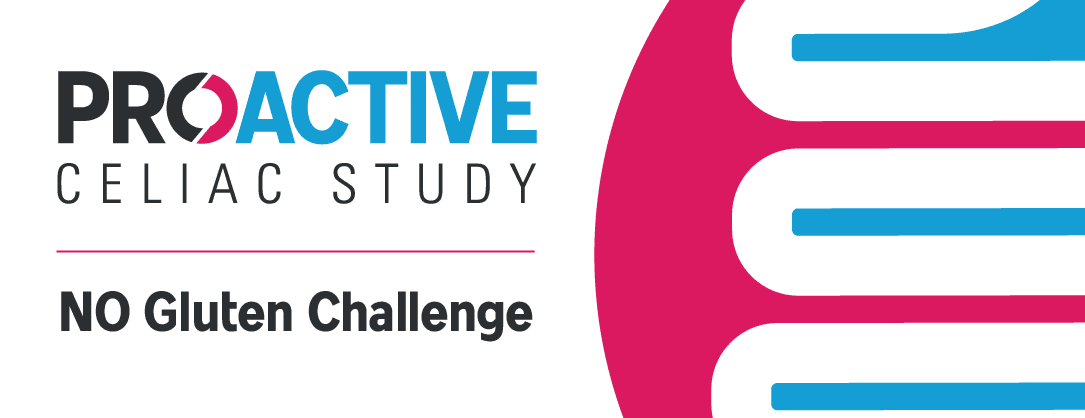A trial that launched in late August will test PRV-015 in symptomatic celiac disease patients

By Kate Avery, Director of Research and Patient Engagement
Provention Bio, a Delaware-based biopharmaceutical company focused on developing treatments for autoimmune diseases, including celiac disease, Type 1 diabetes, and lupus, is launching a Phase 2b trial for celiac disease. Only two celicac disease drug candidates, larazotide acetate (owned by 9Meters Biopharma, formerly Innovate) and latiglutenase (owned by ImmunogenX), have reached this stage of development. Phase 2b means the drug has shown proof-of-concept in Phase 2a trials, and it is the last step before pivotal Phase 3 trials.
The PROACTIVE (PROvention-Amgen Celiac protecTIVE) Study launched at sites in the US in late August 2020, with international sites including Canada opening later in the year. The trial will test how well three different doses of PRV-015 reduce celiac disease symptoms and other measures of disease activity compared to placebo.
PRV-015 (formerly studied as AMG-714) previously showed proof-of-concept in a Phase 2a gluten challenge study in celiac disease conducted by Celimmune in partnership with Amgen. Amgen acquired Celimmune and is partnered with Provention Bio to conduct the Phase 2b trial. PRV-015 functions as an anti-interleukin 15 antibody. Interleukin-15 (IL-15) is a cytokine released as part of the body’s immune response to gluten in people with celiac disease. Previous studies have shown IL-15 plays a central role in celiac disease, creating inflammation and intestinal damage. PRV-015 is designed to block IL-15 and therefore limit inflammation and intestinal damage and reduce symptoms. In addition to the celiac disease Phase 2a trial, PRV-015 has also been tested as a treatment for refractory celiac disease (intestinal lymphoma after many years of gluten exposure in celiac disease), and was originally tested for safety and efficacy in patients with rheumatoid arthritis (with positive results) and psoriasis.
While the previous Phase 2a study in celiac disease conducted by Celimmune did not meet its primary endpoint of preventing damage to the intestine in participants receiving a high-dose gluten challenge, study participants receiving the drug did report significantly fewer symptoms and showed reduced inflammation. This means the drug would likely need to be used in conjunction with a gluten-free diet. Additionally, among a smaller group of study participants who did not have the gluten challenge, there was a trend towards improvement in intestinal damage, demonstrating that the drug has potential to protect against gluten from cross-contact. Safety data from this and previous studies suggests an acceptable safety profile. At the time, it was noted that this was the first, and remains the only, drug to show improvements in intestinal inflammation and symptoms in response to gluten in a clinical trial.
The current trial is designed to identify the optimal dose for Phase 3 trials by evaluating multiple doses of PRV-015 in conjunction with a gluten-free diet in people with celiac disease who continue to have symptoms. Instead of a gluten challenge in which participants must eat a certain amount of gluten, participants will only be exposed to the gluten they might encounter through cross-contact in their daily lives – a more “real-world” study. Previous studies have shown that even while on a gluten-free diet, many people are still regularly exposed to gluten and up to 50% may continue to have symptoms, positive antibodies in their blood, or intestinal damage.
According to Clinicaltrials.gov, the primary goal of the study is to measure changes in symptoms as reported by participants completing a daily symptom diary, and to determine if PRV-015 reduces symptoms significantly more than placebo. Three dose levels will be tested to determine which is most effective.
At the 2019 Beyond Celiac Research Symposium, panelists Joe Murray, MD and Sonia Kupfer, MD noted that many of their celiac disease patients have expressed an interest in a treatment beyond a gluten-free diet. They also noted that clinical research can’t move forward without participants in clinical trials.
Celiac disease research remains important even in the current pandemic. Thus far, there is no evidence that people with celiac disease are at higher risk of becoming infected with COVID-19 or at increased risk of severe outcomes if infected. Each clinical trial site will be required to follow local public health guidelines for participant safety.
Beyond Celiac is working with Provention to recruit participants for this trial as part of our commitment to accelerating research. For more information about the PROACTIVE Study and to see if you qualify, visit this link. More information about the trial is also available at ClinicalTrials.gov.
Opt-in to stay up-to-date on the latest news.
Yes, I want to advance research No, I'd prefer not to